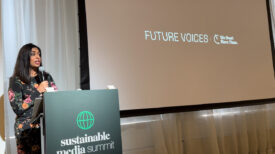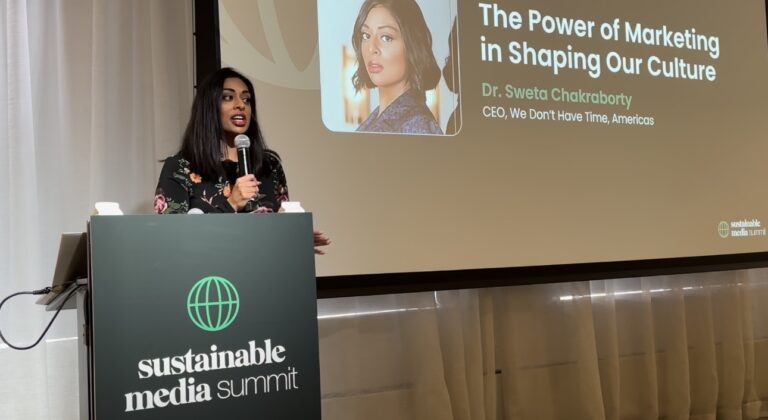opinion
The power of marketing to shape consumer behavior was a central theme at the Sustainable Media Summit hosted by Horizon Media in New York last week, where Dr. Sweta Chakraborty, climate behavior scientist and CEO of We Don't Have Time North America, delivered a thought-provoking keynote speech, encouraging the industry to apply their expertise to a new purpose: sustainability.
“Now is the time to use it for good.”
Dr Chakraborty argued that marketing, with its traditional focus on promoting consumption, has contributed to our current environmental problems. “It's all about consumption. It's the kids who point to the brands and we as parents give in, and we've been engaging with the planet this way for decades, but now it's unsustainable,” she explained. To change this, she proposed a future where marketing is a tool for positive change.
“You can create a psychotic condition called PMS,” Chakraborty said, referring to a marketing campaign led by pharmaceutical giant Eli Lilly that rebranded PMS, a natural hormonal change, into a medical condition called PMDD. The approach, Chakraborty said, was aimed at creating a new market for the lucrative antidepressant Prozac, which was coming off patent. “That's the power of marketing. Now is the time to use it for good.”
Marketing can reframe values and make sustainability the norm
Chakraborty suggests that behavioural science holds the key: by understanding the decision-making processes in the human brain, marketers can craft messages that encourage sustainable choices.
She stressed that humans are naturally biased towards immediate threats, making it hard to grasp the slow-moving crisis that is climate change. “The media goes big on stories that make headlines,” she said. “This is where marketing can help. We need to make climate risks more accessible, more personal.”

To illustrate how marketing can make sustainability tangible, Dr Chakraborty shared a case study of a campaign focused on everyday weather variability, emphasizing that cross-industry collaboration is crucial in crafting impactful messaging.
The good news, according to Chakraborty, is that there is a growing global consensus about the need for change. “Even the oil and gas industry is calling for a transition,” he says. “Let's stop using marketing to create false needs and start using marketing to build a better future.”
Dr Chakraborty's call to action resonated with an audience of media and advertising professionals. The Summit promoted a culture of sustainability beyond consumption and sparked a discussion on how marketing can be a powerful force for environmental protection.


